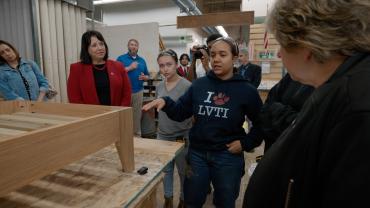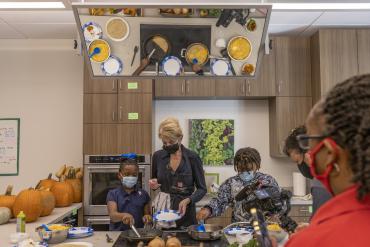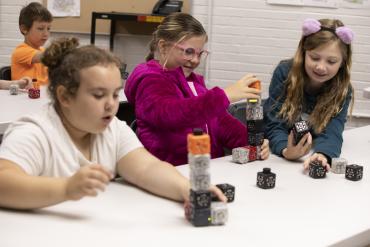“The right and the MAGA crowd portray teachers as bad, but it’s just not the truth. I don’t know one teacher out there, not one, who’s not trying their hardest to help the kids and close the gap that COVID caused. We will close that gap. We’re here to better kids’ lives. The AFT is stepping up to the plate to help us do that.”
That’s Anthony Nicodemo, president of the Greenburgh-North Castle United Teachers in New York, talking about the grant his local just received from the AFT’s Real Solutions for Kids and Communities campaign.
The campaign is focused on strategies that strengthen and improve public schools—and to help translate that vision into reality, the AFT has announced 40 back-to-school grants to its local affiliates, totaling more than $500,000.
“While others continue their toxic, politically driven attacks against public education, we are addressing learning loss, loneliness and literacy challenges through proven, transformative strategies to help children recover and thrive,” said AFT President Randi Weingarten. “Instead of banning books, demonizing teachers or censoring curriculum, we’re going to continue investing in our public schools.”
Jacqueline Pogue Lyons, president of the Washington Teachers’ Union, another grant recipient, says the timing of these grants couldn’t be better: “What our students are challenged with, what they’re dealing with—we don’t get to say, ‘We’ll do it tomorrow.’ We have to do it today, to do it now. We gotta get it done.”
Just as the students and communities that AFT members serve are as varied and diverse as America itself, the ways that AFT locals are using their grants are creative, wide-ranging and inspiring.
Civics comes to life in New York state
There’s a huge difference between teaching civics in the classroom and giving kids opportunities to learn by doing through experiential learning, Nicodemo says. His local’s grant will fund a program that enables students to leave the classroom and experience government in action.
“We’re 250 years removed from the Founders,” says Nicodemo. “They had no idea what our country would be like in 2023. Kids should know what goes on in the halls of the state Capitol and Congress and how it directly affects us. That matters more than what George Washington thought about crops in 1785.”
Thanks to his local’s grant, Nicodemo is embarking on an exciting journey with his high school seniors in his government and economics class. They’ll explore the state Legislature in Albany, attend City Council meetings and even aspire to visit Washington, D.C., to witness congressional votes. Through these immersive experiences, Nicodemo aims to empower his students with practical insights for a deeper connection to real-world scenarios.
“This grant will make all the difference,” he says. In his district (which serves 500 special-needs students in four schools, a population that is 100 percent free lunch and 80 percent minority), many students can’t afford to pay for lunch even during a field trip. The farthest Nicodemo has been able to bring his students to date is to a nearby precinct to watch early voting. “We need to teach our kids the basics of how our democracy functions. We need to create critical thinkers. This grant program is an example of our union investing in our youth.”
In Washington, D.C., healing COVID-19’s wounds and fighting for a diverse, experienced teacher workforce
“This contract is all about kids and family,” says WTU President Pogue Lyons, of the upcoming negotiations that her local’s AFT back-to-school grant will support.
One key goal for this local, which represents more than 5,500 teachers and staff serving D.C.’s 50,000 students, is retaining and keeping great educators. As Pogue Lyons points out, the city’s children have never needed them more.
“Since the pandemic, teachers have been coming to us seeing a real uptick in challenging-to-manage behaviors in the classroom. There’s also a real rise in student-on-student violence. We know that means that children are hurting. We knew there was learning loss but were a bit stunned at the level of social-emotional repair work. A lot of kids had been through so much during the pandemic.”
The union’s contract proposals are focused on making schools safe, welcoming places where student can thrive—from enforceable limits on class sizes and caseloads to standard emergency protocols to ensure schools have the capacity to prevent, respond to and recover from traumatic incidents.
Ensuring that educators can make careers in the city is crucial too, Pogue Lyons says—thus the local’s contract proposals focus on what is best for students’ learning environment and educators’ working environment.
“We want to get and keep excellent teachers. We want to keep a diverse teaching staff in this diverse city,” she says. “Most of our students are brown and Black, and our teaching force should be diverse too. We also want to get males to come teach and stay.”
She adds: “We have a really young teaching staff. The average age of our teachers is 31. This is an expensive city. Our young teachers have friends and peers in other professions who make 24 percent more than what they make.”
Pogue Lyons says the Real Solutions campaign is truly union work. “We’re out there fighting, from advocating for social-emotional supports to making up the learning gaps. And the AFT is with us, every step of the way.”
In San Francisco, using the contract as a vehicle for transformation
As San Francisco schools grapple with a massive teacher shortage—with about a quarter of classrooms missing permanent teachers as the school year started—the United Educators of San Francisco is mobilizing members and community under the banner “Fighting for the Schools Our Students Deserve.”
Toward that goal, UESF grant funds will fuel a multi-pronged campaign to transform the city’s schools by negotiating a contract that is good for students and fair to educators, developing rank-and-file leadership, amping up educator activism and solidarity, and working in coalition with parents, students, community members, labor unions and community groups citywide.
The union’s proposals include improving special education caseloads, implementing best practices for the creation of true community schools, protecting vital teacher prep time, and raising the floor for classified pay to $30 an hour.
In her opening statement at the first bargaining session that cited the unprecedented challenges San Francisco educators had overcome in the past three years, UESF President Cassondra Curiel issued a rallying cry: “We deserve to be able to focus on the profession that we are best at and to focus on our students because they need us more than they ever have before. … They need us to attract and retain our colleagues, so they have a teacher in their classroom daily. They need us to be fully present and able to care for them, not worrying whether we can make ends meet in this career from month to month. They need us to fight and win the schools they deserve. … What we need is what our students need. What we need is what our schools need.”
‘Put on your own oxygen mask first’: White Plains grant focuses on resiliency skills
The White Plains Teachers’ Association in New York built its grant proposal around “caring for the caregivers” by providing workshops to help teachers and school staff deal with stress and emotional exhaustion and foster their own well-being on the job and in their lives. (The union is also inviting the district’s PSRPs, which are represented by another union [CSEA], to participate in the training.)
“Teaching is a beautiful job, but it’s a difficult job too,” says WPTA President Kara McCormick-Lyons, who is also an AFT vice president. “The last few years have been very hard, for children and educators. We’re in a climate where everything we do is often politicized and misrepresented. Educators across the country are constantly on the defensive, constantly worried about the kids we serve and the future of our public schools and our profession.”
The White Plains school district serves a diverse student population whose needs the school community is invested in meeting. There is strong collaboration between the superintendent/administration and the union. It’s a unique district—as McCormick-Lyons says, “It’s a tree-lined city school district committed to meeting and serving the wide range of needs of its students.”
McCormick-Lyons sees the WPTA program as a way for teachers and school staff to manage stress and burnout—not only so they can thrive, but also to help children recover and thrive.
“As educators, we have to meet the needs of every child sitting in front of us. We pour ourselves out to do that. This program will give us a chance to ‘refill.’ For three hours, we’ll put on our own oxygen masks first, and then we can share these same tools with our students. We have to continue to build up our resilience as professionals and human beings so we can model those good habits for our students and help them become resilient and productive young adults.”
She adds, “I am so proud of the AFT, of our union, because we’re doing what it takes to address the needs of our schools and communities.”
Cincinnati local won’t let dangerous school conditions threaten CTE
Career and technical education is a key strategy of the Real Solutions campaign. But what do you do when one of the few high schools in your district offering CTE programs is downright dangerous for students and staff to attend? If you’re the Cincinnati Federation of Teachers, you demand change—and offer a plan that engages the community to make it happen.
Two shooting incidents near Woodward Career Technical High School in February and April 2023 only deepened existing teacher and community outrage about a school climate plagued by a lack of resources and a lack of safety (from a dearth of student training supplies and internships to broken security cameras). Conditions at Woodward have led to one of the worst records in the district for attendance and safety—and driven away 60 staff in the past two years.
One teacher told the CFT, “The new staff ask me why we don’t walk out. My friends and family ask me why I don’t quit. I’m here because it’s what I believe in my bones I was born to do, and the student who cried and thanked me for being here today tells me I’m right. But coming into the building gets harder and harder every day.”
Responding to urgent pleas from Woodward teachers and alumni, the district committed to community town hall meetings, new surveillance cameras and additional positions for security assistants. But the plan didn’t go far enough. As the CFT noted, “These ‘solutions’ did not involve, nor satisfy, the community or our members. The problems at Woodward require teacher- and parent-led strategies.”
So the union swung into action. Its AFT grant will enable the CFT to launch a project in which the 80-plus teachers and office professional staff at Woodward will work with the community to improve their school’s culture. The plan will draw on help from experts practicing evidence-based conflict resolution at Cincinnati’s Community Learning Center Institute, a longtime CFT partner. The local has also enlisted numerous other community partners: the Cincinnati Youth Collaborative, the Cincinnati AFL-CIO Labor Council/Building Trades, Hamilton County Juvenile Court Judge Kari Bloom and the Woodward Alumnal Association. Woodward administrators are also on board.
The effort will kick off with a series of member/community meetings this fall to define student needs and community assets. By December, the coalition will make a school/community-wide presentation, followed by implementation of a transformative plan to turn around the issues plaguing the school, with a debrief by April.
“The students and educators at Woodward deserve ‘real solutions for kids and communities,’ and the support of this grant will make that possible,” says CFT President Julie Sellers. “Knowing that we are one of so many locals across the nation all sharing our work to break down barriers for our students and strengthen solidarity among our members is empowering. This grant will help us deliver on strengthening our career tech programs here in Cincinnati.”
CFT organizer Michelle Dillingham reports, “As soon as we heard CFT was selected for the AFT grant, we shared the news with our building reps. One said, ‘This is just what we need right now.’”
New Haven Federation of Teachers focuses on safe and welcoming schools
“With the support of this AFT back-to-school grant, school-based teams of NHFT members will engage in action research to identify how we can make our schools more safe and welcoming and put these best practices to work,” says New Haven Federation of Teachers President Leslie Blatteau. “This includes strengthening our partnerships with parents and families and community partners.”
The Connecticut local will begin with building working groups of members and community partners at five pilot schools to conduct needs assessments and to research best practices, including scheduling focus groups and conversations with parents and families at back-to-school nights and report card nights. Then the groups will implement the recommendations, while getting feedback from students, families, staff and administration.
This first phase will culminate early in 2024 with a Safe and Welcoming Schools Summit where the NHFT working groups, parents, families, students and community partners at the pilot schools will share lessons learned and recommendations for how to continue and sustain this work.
“So many of our members know what to do to make our schools safer and more welcoming. And this grant will elevate our voices and help us to continue this necessary work,” says Blatteau. “We know that implementing Real Solutions requires time and support. And this grant helps us to provide the support that our members and our school communities need.”
‘Together we thrive’: Cy-Fair local connecting with member-parents
The grant project of the Cy-Fair AFT in Texas is an ambitious member engagement and recruitment initiative aimed at potential and current members who are also parents. As Nikki Cowart, the local’s president, says, “The majority of our union members are also parents and grandparents of our public school students. The two aren’t separate forces working against each other. We are one.”
She adds, “Our union is hearing from parents wanting to partner in new ways, to come alongside our public schools and school employees. Parents know that when school employees thrive, our students thrive—together we thrive.”
The local’s action plan includes canvassing, listening tours, phone banking, member-to-potential-member postcards and social media engagement, all with the aim of creating a community committee to engage the district as both union members and parents/grandparents.
Cowart says, “We are ecstatic to be awarded our first-ever grant. We’re proud that our union is working for real solutions and focusing on what students need, not on political infighting.”
The effort couldn’t be more well-timed in this third-largest-in-Texas, Houston-adjacent district serving nearly 120,000 students. The district is searching for a new superintendent, and four school board seats are up for grabs in November (voter turnout will be vital, as the last two school board elections drew only 11 percent of eligible voters).
And uniting with parents and voters is crucial in a state embattled over education: Gov. Greg Abbott is poised to call a special session this fall to push through school vouchers (so far blocked by Democrats and rural Republicans). Teachers are the only state employees who did not get raises this past legislative session. And while a GOP-backed “Don’t Say Gay” bill as bad as Florida’s failed, the Legislature did pass a draconian new law (now tied up in court) that would actually force book vendors to engage in book censorship when selling to schools.
Says Cowart, “Like in many areas of the country, but especially in Texas, there has been a false narrative around failing schools. But we know the truth. The truth is our educators are helping our kids recover and thrive more than ever.”
Cowart believes that community is the antidote to fear and division: “Once community members feel heard and among like-minded people, the fear factor gets eliminated. When you connect families into the hub of our public schools, anything is possible. We will elect policymakers who support our public schools in a very real way. We as a union can change the narrative for the kids we serve.”




